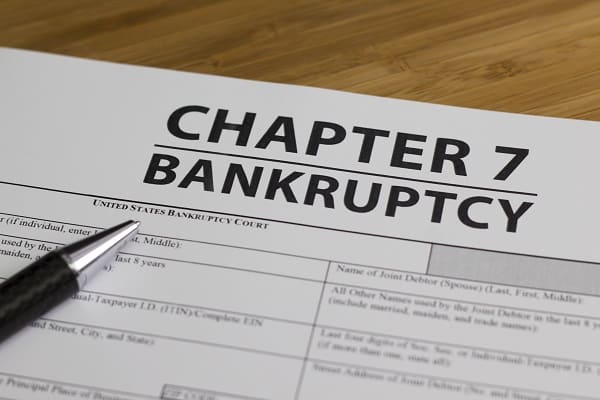
What Are the Qualifications for Chapter 7 Bankruptcy?
If your debts are out of control, you’re likely dodging calls from creditors and feeling like your world is spiraling. Financial hardship can seem overwhelming—especially with mounting bills, wage garnishments, threats of foreclosure or repossession, and the constant stress of living on the edge. If this sounds familiar, you’re not alone. Every year, thousands of Texans choose to file bankruptcy to regain control and rebuild. But which bankruptcy chapter is right for you, and do you qualify? The legal team at Machi & Associates, P.C., Arlington’s most trusted bankruptcy law office, specializes in guiding individuals and families through the qualification process to find swift, effective relief.
The majority of bankruptcies filed in the U.S. are under Chapter 7. If you qualify, Chapter 7 bankruptcy discharges almost all of your unsecured debts and allows you a true fresh start. However, not everyone qualifies, and not all debts are eligible for discharge. Below, you’ll find a comprehensive guide to who qualifies for Chapter 7 bankruptcy in Texas, what you need to know before filing, and how Machi & Associates, P.C. can help you secure your future with confidence.
Overview: What Is Chapter 7 Bankruptcy?
Chapter 7 bankruptcy is often called "straight bankruptcy" or "liquidation bankruptcy." It is designed for people whose income is insufficient to pay even their minimum bills. In a successful Chapter 7, most or all unsecured debts (like credit cards, personal loans, medical bills, and utility arrears) are wiped out completely. In exchange, a trustee may sell (liquidate) some of your non-exempt assets to repay creditors—but with Texas’s generous exemptions, most filers keep everything they own.
Chapter 7 is often the fastest path to debt relief, usually wrapping up in just a few months. Once you file, collection calls and lawsuits stop immediately—giving you the breathing room to start again. However, strict qualifying requirements (the “means test” and other factors) determine who is eligible. That’s where Machi & Associates, P.C. comes in—we review every factor to help you navigate your eligibility and exemption options.
Chapter 7 Bankruptcy Means Test
In 2005, Congress made the means test central to qualifying for Chapter 7 bankruptcy. The purpose of the means test is to determine whether you have enough disposable income to pay back a portion of your debts. If so, you may be required to file for Chapter 13 bankruptcy and commit to a repayment plan instead.
Step 1: Median Income Test
The first part of the means test compares your household income (from all sources, including wages, business income, rental income, unemployment, and child support) to the median income for a Texas household of similar size.
- If your income is below the Texas median, you automatically pass the means test and can file Chapter 7 with no further calculation needed.
- If your income exceeds the median, you must complete the full means test by deducting all “allowable expenses” to see if you have enough disposable income to repay creditors.
Median income limits are adjusted annually. An experienced bankruptcy attorney at Machi & Associates, P.C. will look at your full financial picture and compare it to the latest standards.
Step 2: Means Test Calculation (If Needed)
You’ll be required to detail all income and necessary expenses, including:
- Taxes, Social Security, insurance
- Mortgage or rent, utilities
- Car payments, transportation
- Food, clothing, healthcare expenses
- Secured debts and child support obligations
After subtracting these allowed expenses, if too much “disposable income” remains—a sum the government deems sufficient to pay creditors over time—you will “fail” the means test for Chapter 7.
- If you don’t pass, you’re not out of options. Machi & Associates, P.C. will advise you on Chapter 13 eligibility, potential expense adjustments, or lawful ways to pass the means test.
Who Can File Chapter 7 Bankruptcy in Texas?
- Individuals and Married Couples: Both single and joint petitions are allowed. Couples can file together or individually, depending on circumstances.
- Businesses: Corporations, partnerships, and sole proprietorships may also file, but the discharge only applies to the business entity—not the business owner’s personal debts unless filed jointly.
- Prior Filers: You must wait eight years after a previous Chapter 7 discharge and six years after a Chapter 13 discharge to file again.
- Residency/ Filing Requirements: You must have lived in the state for at least 91 days before filing in Texas.
Texas Chapter 7 Bankruptcy Exemptions
One of the reasons Texas ranks as one of the most debtor-friendly states is its generous list of exemptions. Exemptions allow you to keep certain property—often everything—for your basic life and work needs, even after bankruptcy. While federal exemptions are available, most Texans benefit from using state exemptions. Exempt assets include:
- Homestead Exemption: Unlimited value, provided the home is on up to 10 acres in an urban area or 100 acres (single) or 200 acres (family) in rural areas. Most people can keep their home even with significant equity.
- Motor Vehicles: One vehicle per licensed household member, regardless of value.
- Personal Property: Clothing, furniture, family heirlooms, up to $50,000 ($100,000 per family) in household goods, jewelry, tools for your trade, sporting gear, and more.
- Retirement Accounts: 401(k)s, IRAs, government pensions are fully protected.
- Insurance Benefits: Life insurance, health/disability benefits, and cash surrender value up to limits.
- Social Security, Unemployment, Workers’ Compensation, Veterans Benefits: All exempt from creditors and bankruptcy sales.
A key part of qualifying for Chapter 7 is planning your exemptions—making sure your property falls within exempt categories and values. Machi & Associates, P.C. reviews your entire asset inventory, applies the most protective exemptions, and if necessary, may advise on strategies like spending down non-exempt cash on necessities prior to filing.
Who Should NOT File Chapter 7?
There are situations where Chapter 7 is not the right solution:
- You have lots of non-exempt property that you could lose.
- Most debts are nondischargeable (like recent taxes, student loans, child support, alimony, or certain court judgments).
- You have significant income or assets and would have to “fail” the means test.
- You previously filed Chapter 7 within the past eight years, or Chapter 13 within the last six years, and aren’t eligible to file again yet.
- You want to keep property you’re behind on (like a home or car)—in this case, Chapter 13 may be a better fit.
A full analysis of your income, property, and debt type by Machi & Associates, P.C. is essential. Sometimes waiting a few months can change your eligibility dramatically—let our team help you plan the best timing.
What Debts CANNOT be Eliminated by Chapter 7 Bankruptcy?
Many clients come to our firm expecting a total “clean slate”—only to discover that certain debts cannot be erased by law. Common nondischargeable debts include:
- Child support and alimony
- Recent tax debts and some tax penalties
- Debts from fraud or intentional harm to others
- Student loans (with rare hardship exceptions)
- Criminal fines and restitution
- Certain HOA or condominium fees
- Debts not listed in your case
Our attorneys explain all limits and plan your bankruptcy to maximize every possible discharge. For more details on what debts are not dischargeable and how to handle them before or after bankruptcy, see our page on nondischargeable debts in Texas bankruptcy or reach out for a free consultation.
Key Steps Before Filing for Chapter 7 Bankruptcy
1. Collect Financial Documentation
Gather pay stubs, tax returns for at least the last two years, documents about major assets (deeds, car titles, insurance policies), bank statements, and recent bills or collection notices.
2. Review Your Credit Report
Ensure you have a complete list of all creditors and debt types to avoid missing any dischargeable bills in your filing.
3. Complete a Credit Counseling Course
Before filing, you are required to take a government-approved debtor education course. This is a short session (available online or by phone) that must be completed within 180 days of filing your bankruptcy petition.
4. Meet with an Experienced Bankruptcy Attorney
Your eligibility, exemption planning, and strategic timing cannot be overemphasized. Working with Machi & Associates, P.C. avoids costly mistakes or unneeded losses. We handle all paperwork, forms, deadlines, and communications with the court, creditors, and trustees.
Filing Process and Timeline for Chapter 7 Bankruptcy in Texas
The typical timeline for Chapter 7 is as follows:
- Assessment and consultation with Machi & Associates, P.C.
- Gathering of all financial documents
- Complete credit counseling course
- Your attorney files the petition with the bankruptcy court
- Automatic stay goes into effect—stopping collections and most lawsuits
- Attending a “Meeting of Creditors” (341 meeting)—your only court appearance
- Trustee reviews case; rarely, non-exempt assets are surrendered
- In about 3-5 months, most debts are discharged and your “fresh start” begins
Throughout the process, the attorneys at Machi & Associates, P.C. answer every question and guide you, making what is often a scary time much less stressful.
Can Chapter 7 Help If You’ve Been Hurt by a Personal Injury or Illness?
Many people who come to us for bankruptcy are there because of medical bills or a major life event—such as a car accident or workplace injury. The financial fallout of a serious injury can lead to the need for both skilled Texas personal injury representation and bankruptcy relief. Machi & Associates, P.C. is one of the only local firms with in-depth expertise in both areas, so we can help clients pursue compensation and protect their finances, no matter what combination of challenges you are facing.
Chapter 7 Bankruptcy FAQs
Can I keep my house and car if I file Chapter 7?
Most Texans keep their primary residence and at least one car, provided they are current on payments and claim the right exemptions. Our exemption planning is thorough—you may not have to give up anything at all.
Will bankruptcy ruin my credit forever?
Chapter 7 does remain on your credit report for 10 years, but for many, their scores begin to recover within months post-discharge. With a clean slate, you can build new, healthy credit—and our office provides practical post-bankruptcy rebuilding tips.
What if I fail the means test?
You may qualify for Chapter 13 or, in some cases, strategic action or better documentation can help you pass on a second try. We explore every avenue for you before moving forward.
How soon after a previous bankruptcy can I file again?
After Chapter 7, you must wait 8 years to file again; after Chapter 13, 6 years. Talk to us about your options if you need further relief.
Contact Machi & Associates, P.C. for Trusted Chapter 7 Bankruptcy Guidance
Every situation is unique. The seasoned attorneys at Machi & Associates, P.C. offer free, no-pressure assessments to evaluate your eligibility, the best timing for your filing, and how to protect your most important assets and relationships.
If you’re struggling with overwhelming bills, creditor harassment, or the threat of repossession, don’t wait. Take control with the help of Arlington and Dallas’s most respected bankruptcy team. Call Machi & Associates, P.C. today or reach out through our website for expert, compassionate help. Your fresh start is just a conversation away.






